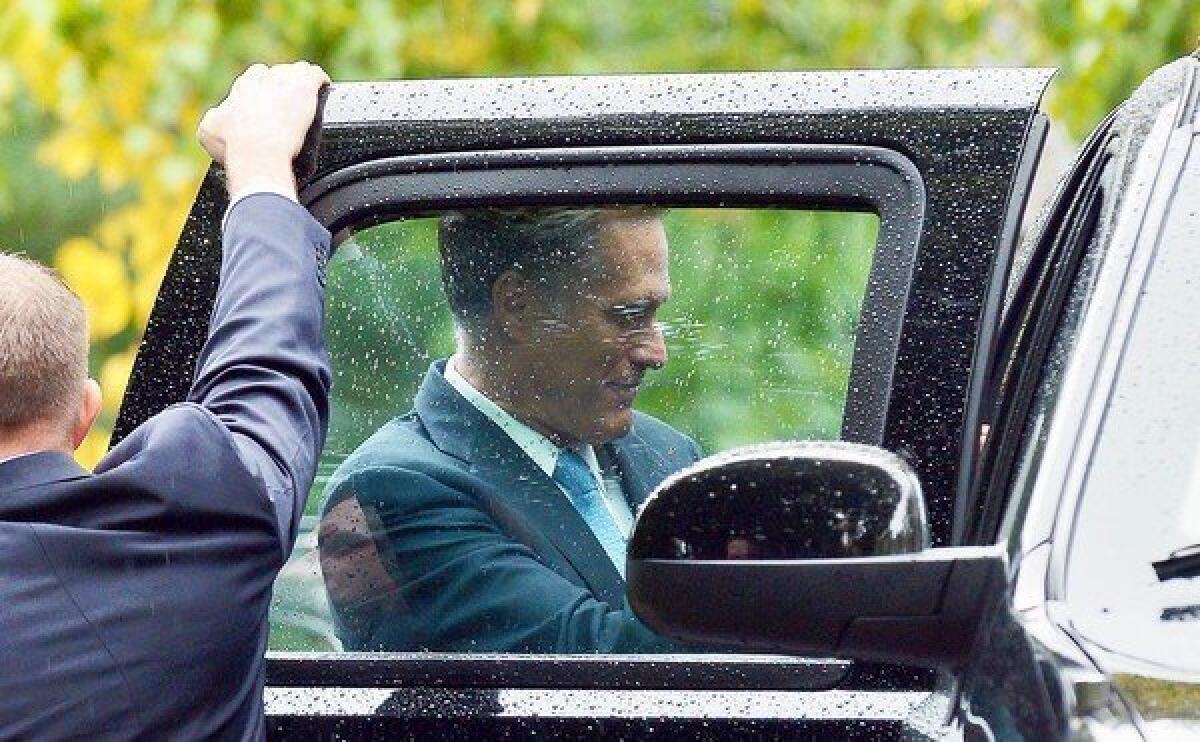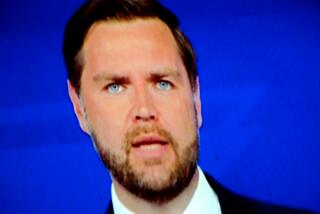Debates are Romney’s best chance to reverse tilt toward Obama

- Share via
The presidential race enters its final, decisive phase with a distinct tilt toward President Obama and three debates looming as Republican Mitt Romney’s best and possibly last chance to reverse the Democratic trend.
After running neck and neck with Romney for months, Obama has opened up leads — some small, others more significant — in almost all of the eight states likely to decide the contest: Florida, Ohio, North Carolina, Virginia, Colorado, Iowa, Nevada and New Hampshire.
Obama also leads in Wisconsin, the home state of Rep. Paul D. Ryan, the GOP vice presidential nominee, whose mid-August selection had erased the president’s advantage there for a time.
PHOTOS: Mitt Romney’s 2012 campaign
In all, Obama has locked up or is comfortably ahead in contests for 237 of the 270 electoral college votes needed to win reelection, compared with 191 for Romney. That leaves 110 electoral votes still up for grabs after several states, including Pennsylvania and Michigan, have seemingly fallen from contention and settled in Obama’s column.
Whether the movement is the result of several difficult weeks for the former Massachusetts governor, as Republicans and Romney insiders suggest, or reflects a genuine inflection point, as Democrats and Obama strategists believe, analysts say Romney must do something to shake up the race or he will almost certainly lose on Nov. 6.
The debates — especially the first one Wednesday in Denver — present Romney with a vital opportunity to turn the direction of the contest.
“Television ads aren’t going to change this race,” said Matthew Dowd, who managed President George W. Bush’s 2004 race, the last time an incumbent sought reelection to the White House. “Speeches aren’t going to change this race and staff’s not going to change this race.”
There is always the prospect of an unforeseen event, such as a domestic or international crisis, undermining support for the president and upending his candidacy. But it is not at all clear that such an episode would redound to Romney’s benefit with election day so near. Even the Iranian hostage crisis, which proved a foreign policy debacle for President Carter, initially led Americans to rally around the incumbent.
The effect of an “October surprise,” as political practitioners have come to call it, might also be mitigated by early voting. Already, ballots are being cast in more than half the states. By the completion of the third presidential debate on Oct. 22, two weeks from election day, a majority of residents may have already voted in such battlegrounds as Florida, Colorado, Nevada and North Carolina.
That is why Wednesday’s first debate will be so important: It will very likely shape the narrative of the race for days afterward and set expectations for the two sides heading into an Oct. 11 matchup of the vice presidential candidates and the two Romney-Obama sessions that follow.
Obama arrived in southern Nevada on Sunday for several days of pre-debate cramming at Lake Las Vegas, a resort community in the suburb of Henderson. Romney, who has been practicing for months, was closeted with aides in Boston for another round of rehearsals.
As the challenger trailing in polls, Romney could gain the most from the debates, depending, of course, on his performance.
Just by stepping on stage at the University of Denver, Romney could enhance his stature. As Obama strategists — anticipating the post-debate analyses — are eager to point out, a challenger often gets a boost, at least in the first face-to-face meeting, just by standing alongside the incumbent and holding his own. (Contrary to efforts by both sides to lower the bar, both men are skilled in the cut-and-thrust of campaign debates.)
Republicans, frustrated with Romney’s campaign, said he needed to do more than recite familiar talking points and parry Obama’s scripted zingers. They urged him to seize the opportunity — with tens of millions watching — to make a clearer, more forceful case for himself to voters who don’t seem especially eager, despite high unemployment and slow economic growth, to oust the incumbent.
“What I don’t think Romney has successfully done yet is make the case he would be better on the economy,” said Dick Wadhams, a veteran Republican strategist and former head of the Colorado GOP. “Part of the reason is that the Romney campaign for too long was trying to make this a referendum on Obama, when it was always going to be a choice election.”
Given Romney’s debate performances during the primary season, when the Republican candidates met nearly two dozen times, Wadhams said he was confident the GOP nominee could rise to the occasion. He had better, Wadhams added: “If he doesn’t, I don’t know what he can do to change the dynamic of this race.”
Despite Obama’s current edge in the polls, however, neither side is ready to declare the race over.
Although the president is ahead in the battleground states, he has yet to put any of them safely away. The surveys also suggest that undecided and still-persuadable voters have a dimmer view of the economy and the direction of the country and are not as personally enamored of the president as other voters. That provides an opening for Romney, who, advisors point out, remains competitive despite several of the roughest weeks of the campaign.
But breaking through in the debates may prove a challenge. Though a strong showing, or stumble, has shaken up a few races, there is no solid evidence that a candidate has ever won the White House solely as a result of a debate performance.
In the popular telling, a vigorous John F. Kennedy prevailed in 1960 by besting a pale and sweaty Richard M. Nixon in their first meeting. But Kennedy’s win could just as easily be ascribed to controversial election day victories in Texas and Illinois.
Twenty years later, Ronald Reagan supposedly turned around his fortunes in a masterful debate with Carter a week before the election. First, he disarmed a pointed Carter statement with a folksy retort, “There you go again.” And at the end of the debate — in what has become a classic line — he asked dispirited Americans whether they were better off than they had been four years earlier.
But that was not why he beat the Democratic incumbent, said Stuart Spencer, Reagan’s chief political strategist.
Yes, the debate helped, Spencer said, but Reagan already had strong momentum heading into the showdown. Most important, Spencer said, was Reagan’s performance in the weeks leading up to that night: an unswerving dedication to a simple, oft-repeated message. That is something Romney has failed to do.
Perhaps mindful of this history, the Romney camp rejects the notion the debates will be do-or-die for the GOP ticket.
“The debates … are essentially going to be a conversation over four nights,” said spokesman and Romney strategist Kevin Madden. At the same time, the campaign will be advertising, the candidate will be visiting battleground states and organizers will mobilize an extensive grass-roots operation.
“We’re going to reach voters … with a whole bunch of different working levers of the campaign,” Madden said.
POLITICAL CARTOONS: Horsey’s Top of the Ticket
More to Read
Get the L.A. Times Politics newsletter
Deeply reported insights into legislation, politics and policy from Sacramento, Washington and beyond. In your inbox three times per week.
You may occasionally receive promotional content from the Los Angeles Times.











